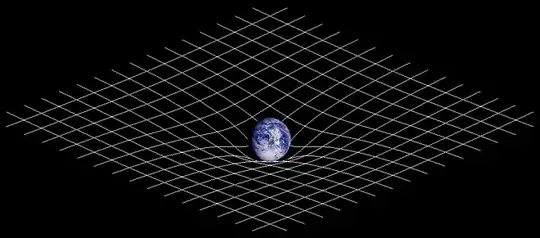What is the speed of gravity in a Schwarzschild metric?
As far as we know it's the speed of light.
The question "How does gravity escape a black hole?" has been asked, but the responses are not fully satisfying.
I can see this old question. It seems to focus too much on gravitons. Gravity doesn't work because there's particles called gravitons flying back and forth. And electromagnetism doesn't work because there's particles called virtual photons flying back and forth. Magnets don't shine. Hydrogen atoms don't twinkle. Virtual particles are virtual. They only exist in the mathematics of the model.
Frederic Brunner gives a startling intuitive answer: "Gravitational attraction ... is due to curvature of spacetime outside the black hole.
Is this the answer you're referring to? It's more or less right.
This answer, however, may not be correct, as I will show from a reductio ad absurdum argument below: Brunner's idea that attraction is due to curvature outside the black hole should generalize to Schwarzschild metrics for objects other than black holes. This would mean that the gravitational attraction of, say, a planet does not emanate from its mass, but is already present in the space outside the mass. In practice then, the effects of gravity in a Schwarzschild metric would be known at infinite speed. Thus, it appears one could send a superluminal message using the oscillating gravitational force from, say, an oblong rotating asteroid, by changing the the frequency of rotation. The amplitude of the oscillation falls off roughly as 1/r**4, but can be detected in principle.
Your argument is the wrong argument I'm afraid. You should be able to work that out from the rubber-sheet analogy:
 CCASA image by Johnstone, see Wikipedia
CCASA image by Johnstone, see Wikipedia
This plot depicts spacetime curvature. If there was no curvature, the plot would be as flat as a board, and there would be no gravity. The force of gravity at any one location relates to the slope at that location. The tidal force relates to how curved it is at that location, and gravitational time dilation at some location relates to the depth of potential. If you replaced the Earth with a rotating oblong, you would be waving the rubber sheet a little, changing the slope a little, or like Jerry said, "changing the metric". This waving is thought to propagate at the speed of light, but it isn't why an object falls down.
Of course a better analogy would be three-dimensional, rather like this picture, but pushing out rather than pulling in:
 Image credit: Christopher Vitale of the Pratt Institute
Image credit: Christopher Vitale of the Pratt Institute
The way it works is that a concentration of energy in the guise of a massive body "conditions" the surrounding space, altering its properties, this affect diminishing with distance. See Einstein talking about it here in 1920: "According to this theory the metrical qualities of the continuum of space-time differ in the environment of different points [20] of space-time, and are partly conditioned by the matter existing outside of the territory under consideration". Google on Einstein elastic. It's rather like space is this gin-clear ghostly elastic continuum. Injecting some mass-energy into the middle of it pressurizes it, the effect diminishing with distance.
 CCASA image by Johnstone, see
CCASA image by Johnstone, see  Image credit: Christopher Vitale of the Pratt Institute
Image credit: Christopher Vitale of the Pratt Institute